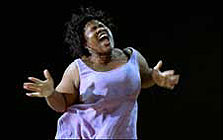|
|
|
|
Dances
of Ecstasy
|
 |
|
This documentary delves into the worldwide phenomenon of trance-dancing, the mystical state achieved when dancing leads to a loss of consciousness. The film eschews a conventional voice-over narration for the sake of an impressionistic collage of images and sound-bites from participating dancers. The advantage of this technique is its ability to take us directly into the dreamy, hypnotic mood of trance-dancing – although, as in many current documentaries that strive for lyrical effect, one wishes the filmmakers would occasionally take their fingers off the slow-motion button. The disadvantage is the effect familiar from the Koyaanisqatsi/Baraka school of poetic documentary – the blurring of all cultural differences. Techno-ravers, Whirling Dervishes, shaman healers and Nigerian priestesses all blend into the same churning mass. Only one point of contention – the use of drugs to aid out-of-body experience – is allowed to surface. As for religious and other philosophical differences, forget it. Even the nitty gritty, technical stuff about how these various groups work themselves into the ecstatic state remains pretty vague. Dances of Ecstasy is quite enthralling in its evocation of a mental and physical release that most of us long for. But it is also frustrating in its somewhat elitist tone. The ordinary use of dancing for fun, sociality, exhibitionism or erotic display is never mentioned – perhaps the filmmakers consider it too banal, too vulgar, too self-centred. And for all the stirring talk of transcendental dance altering consciousness and changing the world, I found myself wanting the film to make some direct link between ecstatic trance and the real, material world of power and politics. If only some world leader would come forth and confess that he or she lost consciousness in a twelve hour trance-dance before signing an earth-shattering piece of progressive legislation ... what a wonderful world it would be. © Adrian Martin October 2003 |
![]()